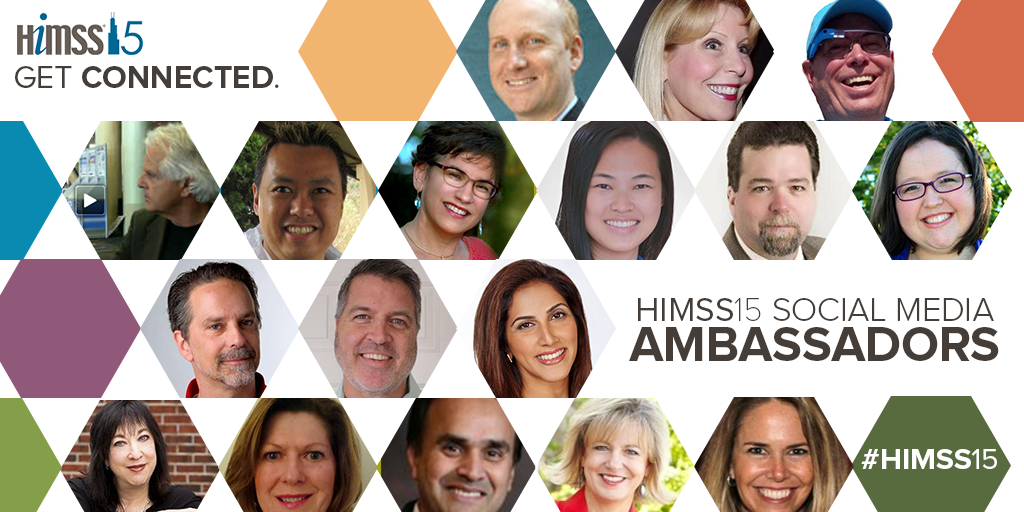Social Media is rapidly becoming an integral part of our lives. Despite the pervasive nature of the communication channel healthcare remains a technology laggard. This presentation from HIMSS15 Wednesday Apr 15) will offer insights to help understand why healthcare professionals should join the community, participate in the discussion and how can do so successfully.

I presented this topic at HIMSS15 on Wednesday Apr 15 - you can find the listing here. As promised I am posting a summary of the points as well as a link to the Slideshare for that presentation
You can find the presentation on my slideshare (nvt) here
####### Add link to uploaded ppt
Technology is all pervasive in our lives and Social media is everywhere - in fact in a recent survey of 3,000 people conducted in the US, UK and Germany to help counter the limited time with their physicians, patients are seeking information and embracing technology outside of the doctor’s office to come to appointments prepared. Approximately 80 percent of patients feel engaged in their own health:
- 68 percent of patients bring a list of questions to each doctor's consult;
- 39 percent have checked WebMD or another online source in advance; and
- 20 percent bring personal health data from outside monitors.
You can see some 87%o f US adults are online in this Pew internet research so if you are not on board you are missing a huge opportunity but more importantly your patients are forming an opinion about you before they meet you
What is Social Media
- It’s a conversation, not a lecture
- It’s an extension of everyday interaction
- It’s group driven, not top-down
- It’s messy, disorganized & hard to control
- It’s a tool, not an end-point
- But most of all…
If you have not already - go to twitter and sign up for an account
What to Tweet
- What you have read that you want to share with others
- When and where you are speaking
- Something you post on your blog
- A link to a Web site that you find interesting
- Listen to conversations happening online using keywords (hashtags, lists and searches) – learn from your colleagues, friends and patients
- Befriend people – and then earn their trust by solve problems, answering queries, helping and providing useful information
- Share information, valuable content with them
- Questions and Requests for information and help – crowdsourcing answers
- At a minimum – Lurk, Listen and Learn
There are many HashTags to follow and starting by assign friends and colleagues what they follow is a a good start but then get involved - join an online chat and community and take a look at the listing of healthcare hash tags from symplur. Listed below are a few of the healthcare hash tags I follow:
#hcsm (h/c social media)
#HCLDR (healthcare leaders)
#HITsm (health IT social media)#MedEd (medical education)
#mHealth
#eolchat (end of life/elder chat)
#BCSM (breast-cancer social media)
#LCSM (lung-cancer social media)
#BTSM (brain tumor social media)
#S4PM (Society for participatory medicine)
But I received a aggregated list when I polled my followed that included all these:
Others
#QuantifiedSelf
#KareoChat
#HITChicks
#HIT
#healthIT
#hcrefor
#ACA
#ONC
#HL7
#Interop
#IoT
#HIMSS15
#POWHIT - People & Organizations improving Workflow w/HIT
#RareDisease
#foodallergy
#rheum
#bcsm
#gyncsm
#medx
#BlueButton
#patientengagement
Chats
#JACR 4th Thurs 12pm EST
#LCSM Every other Thurs 8pm EST
#BCSM Mon 9pm ET
#HCLDR Tues 8:30pm EST
#MedEd Thurs 9pm EST
and
@twubs @hashtracking or @tweetreachapp
My thanks to all my twitter friends who contributed
@HealthcareWen @HIMSS @lsaldanamd @sjdmd @HealthcareWen @DrJosephKim @dirkstanley @dlschermd @Docweighsin @RossMartin @CraigJoseph @RobertWahMD @ishakir @SteltsMD @JenniferJoeMD @StevenChanMD @CIBR_News @Jim_Rawson_MD @aussiclydesdale @ACRselect @AdamFuhriman @Gregmogel @ruthcarlosmd @techguy @MandiBPro @HITshrink @ahier @RandaPerkinsMD @motorcycle_guy @wareflo @susannahfox @Lygeia @ePatientDave @CMichaelGibson @Colin_Hung @annelizhannan @MelSmithJones @Paul_Sonnier @JennDennard @HIStalk @JohnNosta @2healthguru @lsaldanamd @lisagualtieri @EricTopol @ShahidNShah @DanMunro @Daniel_Kraft
Put yourself somewhere on the Social Media Adoption Curve
Add LinkedIn and Facebook - they offer a different channel and voice - Facebook tends to be more social and LinkedIn tends to be more professional/business orientated
There are some good examples already out there
The Mayo Clinic has several properties and their own published guide book to social media and the University of Maryland Medical Center that has blended many channels
What Not to Do
The JAMA 2012 report Online posting of unprofessional content by medical students highlighted a high proportion of violations and problems and there are plenty of examples of people who failed use basic common sense - I personally like the 12 word Simple Social Media Policy from the Mayo
Don’t Lie
Don’t Pry
Don’t Cheat
Can’t Delete
Don’t Steal
Don’t Reveal
Conclusion
- Social Media for Physicians is a Game Changer
- Social media, when effective, will establish a physician’s brand and connect him/her with those in need of their services
- With increased deductibles, more consumers will “shop” using social media sites.
- Social Media will Expand the Physician’s Role with Patients
- Social media is shaping patient encounters with physicians and that impact is expected to increase significantly
- Extending the patient experience will foster existing patient relationships and improve patient outcomes, especially for long-term chronic conditions.
Where are you on the social media ladder and are you going to climb higher?







